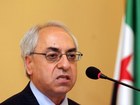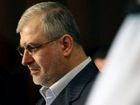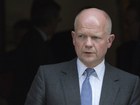The opposition Syrian National Council issued a cry for help Sunday to save Homs and other cities from attacks by President Bashar Assad's regime, and repeated its call for U.N. intervention.
"The country is under a violent attack, especially Homs," said Abdel Basset Sayda, the leader of the SNC, Syria's main opposition group.
 Full Story
Full Story
Head of Loyalty to Resistance parliamentary bloc MP Mohammed Raad said on Sunday that Hizbullah hopes dialogue will lead to “a methodology that guides Lebanese towards the state principle”, pointing out that rational solutions are “necessary to preserve the security of the North.”
During a memorial ceremony in the southern town of Kafra, Raad said that “dialogue is a permanent necessity because it fortifies Lebanon, and contributes to finding appropriate solutions to the crises that beset our country.”
 Full Story
Full Story
Troops pounded besieged districts of the flashpoint city of Homs as 10 people were killed across Syria on Sunday, taking the weekend death toll to nearly 80, a watchdog said.
A civilian was killed in the rebel stronghold of Khalidiyeh, which, like other parts of the central city, was "being shelled and shot at by regime forces who have been trying to enter these districts for several days," said the Syrian Observatory for Human Rights.
 Full Story
Full Story
Syrian authorities on Saturday succeeded in thwarting an armed terrorist group from infiltrating Syria from Lebanon, reported Syrian Arab News Agency, SANA on Sunday.
They said that the armed group was attempting to enter the Syrian region of Tall Kalakh and that all of its members have been killed, said SANA.
 Full Story
Full Story
Britain said the suspension Saturday of the United Nations monitoring mission in Syria "calls into serious question" the viability of the entire operation.
"I regret that it has been necessary for the U.N. mission to decide to suspend patrols and to restrict staff movements due to escalating violence in Syria," Foreign Secretary William Hague said in a statement.
 Full Story
Full Story
Britain's Prime Minister David Cameron and King Abdullah II of Jordan held talks Saturday on ending the "appalling daily slaughter" in Syria, Cameron's Downing Street office said.
They also discussed the Middle East peace process and Britain's marathon efforts to deport radical cleric Abu Qatada back to Jordan.
 Full Story
Full Story
Turkey's foreign minister called Saturday on the U.N. Security Council to take "a new measure" in Syria to stop the crisis there from getting worse after U.N. observers suspended their mission.
"In the event that this observer mission pulls back, there is need for the U.N. Security Council to immediately do a situation assessment and take a new measure to ensure the humanitarian tragedy does not move onto a next level," Minister Ahmet Davutoglu told reporters.
 Full Story
Full Story
Israel expressed concern on Saturday after reports emerged that Syrian president Bashar Assad may be losing control over military assets, including air defense base.
According to Israeli channel 10, concern is mounting in Israel over the possibility that Hizbullah will try to move sophisticated weaponry, including Scud missiles, from Syria to Lebanon to protect them in the event of Assad's downfall.
 Full Story
Full Story
The White House renewed calls Saturday for Bashar Assad to step down at a "critical juncture" in Syria after U.N. observers suspended their mission, saying it was discussing the way ahead with allies.
The unarmed observers have been targeted almost daily since deploying in mid-April to monitor a U.N.-backed but widely flouted ceasefire brokered by international envoy Kofi Annan, and they were likened to "sitting ducks in a shooting gallery" by Susan Rice, the U.S. envoy to the United Nations.
 Full Story
Full Story
The former chief of the main opposition Syrian National Council (SNC) on Saturday urged the United Nations to deploy peacekeepers after U.N. observers suspended their mission in the country.
"We have to send U.N. peacekeepers to Syria on a mission with more people who would be able to protect themselves from the violence of the regime," said Burhan Ghalioun, ex-leader and current political bureau chief of the SNC.
 Full Story
Full Story



